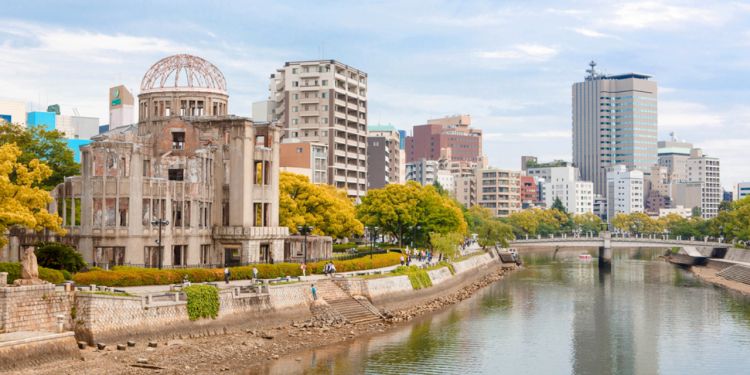
Hiroshima is a miniature barometer of Japan. Be it the population distribution or economic situation, the socioeconomic indicators of Hiroshima prefecture often reflect those of the entire country, hence this notion of a barometer. This got many companies to experiment with their activity there first before going nationwide while taking advantage of the idyllic geographical location of the prefecture and its capital, Hiroshima. But how does one find a job in Hiroshima? Which sectors are recruiting?
Mapping Hiroshima
Hiroshima is the capital and the most populated city of the Hiroshima prefecture, located in the Chûgoku region. The prefecture, at the southwest of the island of Honshu (the actual spelling is "Honshû"), the largest island in Japan, has a population of 2.76 million in 2022.
In 2020, the capital city, Hiroshima City, lies southwest of the prefecture, north of the Seto Inland Sea, and has a population of 1,200,754 individuals. The other cities are much less populated, like Fukuyama, in the southeast of the prefecture, the second largest city with 460,930 inhabitants.
Kure, further south of Hiroshima, is third, with a population of 214,592. Slightly higher on the map, there's Higashihiroshima, which translates into the large island of the west, with Hiroshima meaning large island. It is home to 196,608 people, while the rest of the prefecture cities have between 130,000 and 50,000 inhabitants.
Some of them, like the port city of Onomichi, are known to tourists. Located on the Seto Inland Sea, southeast of the prefecture, a bit further south of Fukuyawa, Onomichi is home to 131,170 inhabitants.
The city has contributed significantly to the economic development of the prefecture. Although Onomichi is known by travelers, it remains quiet and preserved from mass tourism. Hiroshima Prefecture is less famous than Tokyo or Kansai (Osaka, Kyoto, Nara, Kobe) (source: Japan Bureau of Statistics).
History of Hiroshima
The name "Hiroshima" is expressed in Japanese with the characters "large, spacious" and "island", in fewer words, the "wide island". Hiroshima-shi refers to the city ("shi" for city).
Hiroshima-ken designates the prefecture ("ken" for prefecture or county). Ever since its establishment in 1589, the city of Hiroshima has taken advantage of its geographical position to become a major commercial hub.
Under the Meiji era, Hiroshima was made a strategic military port, and during that period of Japan's restructuring, the city became the capital of Hiroshima Prefecture. From that point on, Hiroshima began its industrial and economic development.
An industrial city
Hiroshima is the industrial powerhouse of the entire Chûgoku. Thanks again to its ideal geographical location, the region attracts many companies and investors. Established along the coast, they have contributed to developing Hiroshima's port activity.
Factories there produce steel, rubber, chemical products, and transport machinery, but you can also find automobile factories and shipyards, and in a different field, Hiroshima is one of the country's leading suppliers of needles.
The City of Peace
Hiroshima, along with Nagasaki, is mainly remembered worldwide as the city where the horrors of the first atomic bombs unfolded. The two cities cannot be dissociated from this traumatic episode of world history. The tragedy cost the lives of more than 70% of the population of Hiroshima, with 75,000 people instantly annihilated. About 250,000 others died in the following months and years.
In 1949, the government passed the Hiroshima City Peace Memorial Construction Act with a funding plan to rebuild the city. Since then, Hiroshima has become the symbol of peace. It managed to erase all traces of the trauma. Today's Hiroshima looks like any other city in Japan, and the only ruins preserved are those of the dome in the Peace Memorial Park.
Hiroshima's economy
"Miniature Japan", "National Barometer", and "Large-Scale Hub", Hiroshima Prefecture has many nicknames that reflect its status as a prime location for high-end industrial production. This can be ascertained in almost every field: automotive, electronics, fishing, sports equipment, and film sector.
Industries in Hiroshima Prefecture are primarily focused on "manufacturing" and have established a diverse range of industries, encompassing heavy sectors like shipbuilding, steel, and automobiles and cutting-edge sectors like electrical machinery and electronic parts.
The prefecture places great emphasis on the efficient shipment of manufactured goods, which has led to its consistent top ranking in the Chugoku, Shikoku, and Kyushu regions for 11 consecutive years.
Moreover, Hiroshima Prefecture benefits from its strategic location between the Kansai Economic Area and the Kyushu Economic Area, supported by a well-developed expressway network that facilitates the smooth movement of people and goods.
With a significant share in the wholesale and retail trade among the five prefectures of China, Hiroshima Prefecture serves as a prominent business hub in the Chugoku region (source: https://www.pref.hiroshima.lg.jp/soshiki/44/sangyokigyojoho.html).
Heavy industries
Hiroshima Prefecture ranks 11th in Japan regarding the value of manufactured goods shipped, with approximately 8.8698 trillion yen. The number of business establishments and employees is 4,812 (14th) and 207,756 (11th), respectively, making Hiroshima one of the prefectures that support manufacturing in Japan.
Hiroshima Prefecture is known for its thriving transportation machinery and equipment manufacturing industry, contributing the highest percentage to the total value of manufactured goods shipped (32.9%, or around 2,918.2 billion yen).
The automobile-related sector, spearheaded by Mazda Motor Corporation, plays a pivotal role in this industry, with over 250 companies actively involved (source: Hiroshima Prefecture HP/Economic Census).
In the city of Hiroshima, automobile production is king. The aerospace sector and shipbuilding complete the podium. Around them are many industrial equipment and transportation corporations, steel producers, electronics, rubber, and chemical companies. Not surprisingly, the city's history is strongly connected to the sea. The oldest dock in Japan was initially built there in the 19th century.
The city's expertise in shipbuilding is well-established and is highly sought by companies. They also know that they will have no trouble finding qualified employees on-site. This is an opportunity to be seized by foreigners working in these specialized fields.
Environment
The entire Hiroshima prefecture has experienced sustained development thanks to its heavy industry. However, pollution generated by this sector is becoming an ever-growing worrying issue and ultimately calls for immediate actions to deal with climate change.
The prefecture has launched a vast clean-up operation to protect the Seto Inland Sea and the land. It has gathered the support of major companies in the environmental sector to provide equipment that is more respectful of nature and uses less energy.
These companies also work on innovations, with projects to fight pollution, clean up water, reinstate soils, etc. Hiroshima prefecture is one of the most prolific in this regard. Once again, expatriates skilled in this domain, like engineers in sustainable development and the environment, can easily find a job in their field.
Fishing
Hiroshima prefecture is the leading oyster producer in Japan. It is part of a thriving aquaculture activity but is threatened by pollution and climate change resulting from human activities. This complex problem is similar to pollution caused by heavy industries, which drive the Japanese economy.
In the face of the environmental challenge, there is an urgency to take relevant actions. As such, the prefecture has created a research agency to ensure the sound development of fishing and aquaculture while preserving the environment.
Sports
Most sports equipment manufacturers in Japan concentrate in Hiroshima. In this prefecture, sports are an essential part of people's life, especially when it comes to baseball. Basketball and soccer also have their enthusiasts, and many professional athletes are based in Hiroshima.
Such overall activity results in jobs in various fields, namely in sportswear and sports equipment design, equipment manufacturing, project and quality control management solutions, environment-friendly materials development, and professional sports. The city and the prefecture are making investments to attract world-class sports competitions.
The film industry
And why not work in the motion picture industry? In March 2022, an adaptation of Haruki Murakami's novel of the same name, Drive My Car, won the 79th Golden Globe Award.
The film won the Best Screenplay Award at the 74th Cannes Film Festival the year before. It was a consecration not only for the director Ryusuke Hamaguchi and his team but also for the city of Hiroshima, a full-fledged film protagonist.
The city seized the opportunity of the success of Drive My Car to boast that many film shoots are made in Hiroshima. The city is also home to many studios related to films, TV, advertising, and graphics.
Major companies in Hiroshima City
Automotive Industry
In Hiroshima, the automotive industry can count on Mazda Motor Corporation.
Mitsubishi Heavy Industries, located in Naka in the Hiroshima Prefecture, is a regional industrial giant considered the perfect magnet for local and foreign talent.
They also attract large innovation companies like Kumahira, a leader in safes for financial institutions, or Asukanet, a specialist in 3D technology.
Sustainable development
On the environmental side, MHI Solutions Technologies and Tsuneishi Kamtecs Corporation are innovating in renewable energy and pollution control.
Sports
Hiroshima is home to major sports equipment manufacturers like Molten Corporation, Mikasa Corporation, and Hakuhodo Company.
Motion picture industry
The Hiroshima Film Commission is on a thriving hiring spree. The announcements are only available on their Japanese website, hence the need to learn the language. Other studios offer exciting opportunities, namely advertising with companies like BuzzCrow.
How to look for a job in Hiroshima
Websites
To find a job in the city of Hiroshima, check out the general and specialized websites relevant to your sector. If the company has a website, find out if it is possible to apply directly online. The best way to start your search is on Japanese sites such as Go! Hiroshima! You can find job offers that do not appear on English websites.
With Go! Hiroshima! you can quickly start your job-hunting journey in Hiroshima, from finding company and internship information within the prefecture to getting insights from seniors, including events and experiences.
Other websites:
Career events
The prefecture regularly organizes numerous one-on-one and online events to unite job seekers and companies. If you are already in Japan, join job search groups and associations, especially those related to your sector.
Personal and professional networks
Be they your contacts from your university abroad or in Japan, friends, former colleagues, or simple word-of-mouth, enable all these channels when possible. Also, register on local professional social networks, private groups, self-help platforms, etc.
Tips for finding a job in Hiroshima
Make a thorough assessment of the city
Have you already visited the city and the prefecture where it is located? Since we assume you did not choose Hiroshima by chance, we suggest you look around first.
Those who love Hiroshima talk about how some areas have a traditional and authentic feel, much more so than some areas of Kyoto City, which have been transformed by mass tourism. Find out more about the job market in Hiroshima. With the Japanese labor market being very competitive, not to mention the recent crisis, start by asking yourself some basic questions:
- What are your chances of finding a job?
- Why should employers choose you and not someone else?
Your answers will be crucial, especially in an environment where high-level diplomas play a significant role.
Look for the right fit
This article is focused on finding long-term employment in Hiroshima. This is the type of job for which you can get a Japanese work visa. This does not include odd jobs called baito in Japanese. Be sure to have a clear picture of your goals. Why did you come to live in Japan? Why Hiroshima?
Learn the Japanese language
Finding a job in Japan is difficult, especially since COVID-19 and its resulting economic crisis. Things can be even worse when you move away from the significant employment pool of the capital, Tokyo. However, complicated does not mean impossible. Give yourself the best chance by speaking Japanese, English, and other languages. This is a definite must if you want to live and work in Hiroshima.
Language teaching
A common myth says that registering as a language teacher is the easiest way to get a work visa in Japan. This is not true! Applying for a job in Japan is more challenging than it may seem. With increased unskilled profiles, Japanese language schools have toughened their requirements.
You must prove your skills and qualifications to be a tutor. Some schools require multiple interviews and tests, just like in major companies. The job specifications are challenging and may not always be right for you.
Besides, remember that you can only work in the position listed on your work visa. Therefore, think carefully before jumping on the first job offer. Do not go to Japan just for the sake of going to Japan.
Is Hiroshima a safe choice for expats?
Japanese and foreigners alike often worry about this issue, but the truth is obvious! Healthy centenarians are there to prove that a peaceful life is possible in Hiroshima.
Global companies, such as Mazda that have been around for decades, also show that Hiroshima is safe to live in. If that were not the case, no company would take the risk of locating in an area where employees and families would be exposed to health hazards. The horrendous image of Hiroshima being a hazardous-nuked city is long gone!
What about radioactivity? According to experts, there are no risks on that side either. If it is true that there is still some radioactivity, its levels have nothing to do with those found in 1945 and in the years that followed. Therefore, there is no reason to fear living there. The environmental challenges in Hiroshima are the same as those in any other city in Japan or the world.
Enjoy your new life in the Land of The Rising Sun
You will quickly notice that everyday life in Hiroshima is similar to that of any other city, with that same routine. Since your workdays may not allow you to experience the city as you would like, it is best to travel to Hiroshima a few weeks beforehand to discover the city and deal with the administrative side of things before starting your job.
Once you get there, take the time to adjust. Make the most of Hiroshima's sports facilities to practice or discover new activities. Visit and join cultural clubs and associations and take advantage of your new life. Your expatriation will go even smoother.
Useful links:
Discover the city
Hiroshima City website (in Japanese, multilingual translation possible)
Looking for a job (links in Japanese)
Seminars, jobs dating... job fairs in Hiroshima
GaijinPot Jobs; Daijobs (general websites)
We do our best to provide accurate and up to date information. However, if you have noticed any inaccuracies in this article, please let us know in the comments section below.
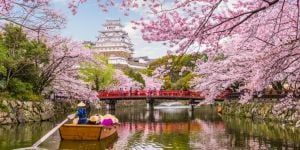
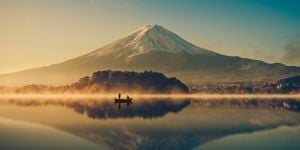
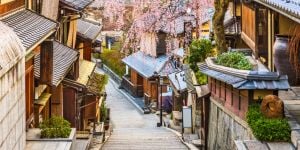
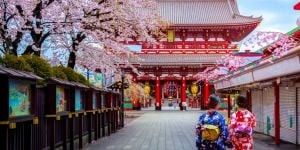

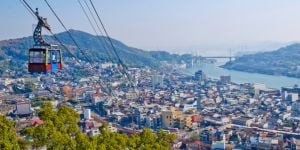

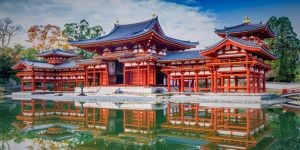




Comments